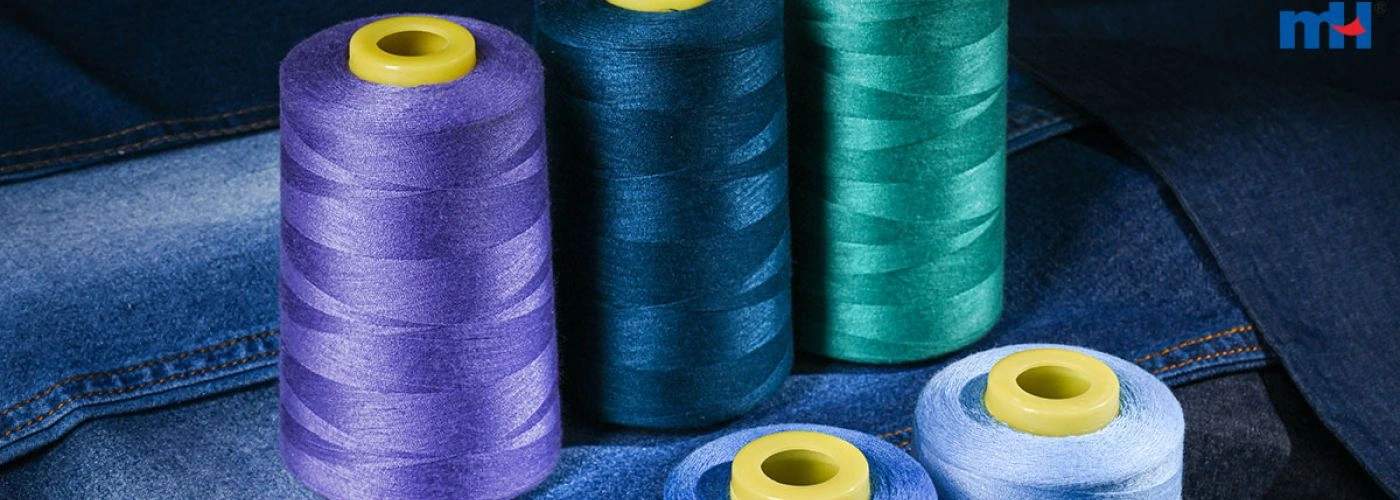
Sewing Machine Sewing Thread: The Ultimate Guide for Businesses
Why Quality Sewing Machine Thread Matters
For apparel and textile manufacturers, choosing the right sewing machine sewing thread is as critical as selecting quality fabric or machinery. The life of a thread directly impacts garment longevity and customer satisfaction, as durable threads help finished products withstand wear and tear over time. A superior thread ensures strong seams, smooth production, and long-lasting garments. High-quality threads maintain their strength and color even after repeated washing, making them ideal for products that require durability and colorfastness. For B2B buyers, investing in reliable thread suppliers means fewer production interruptions, reduced waste, and consistent product performance across different machines and materials. Choosing reputable brands such as Coats & Clark, Gutermann, and Mettler is essential for consistent quality and performance. Paying attention to thread details, such as specifications and machine requirements, is crucial to avoid issues like tension problems and thread breakage during production.
What Is Sewing Machine Thread?
Sewing machine thread is a specialized type of yarn designed to pass smoothly through sewing machines at high speed without breaking or fraying. It must combine strength, elasticity, smoothness, and colorfastness to deliver consistent results. Depending on the fabric and application, manufacturers use different thread types such as polyester, cotton, or blend threads like polyester-cotton blends.
Understanding the different thread types is crucial for selecting the right thread for each application. Each thread is intended for specific uses, such as seams that must withstand stress or for achieving decorative finishes.
Types of Sewing Thread for Machines
1. Polyester Sewing Thread
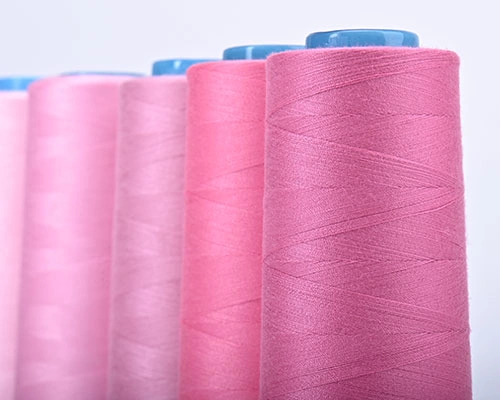
The most widely used type in garment production. MH’s polyester threads are known for their high tensile strength, elasticity, and resistance to abrasion.
- Features: Smooth finish, excellent colorfastness, minimal lint.
- Applications: Ideal for fashion apparel, uniforms, jeans, home textiles, and industrial sewing.
Popular MH Options:
- MH Polyester Spun Sewing Thread: Cost-effective, durable, and suitable for both high-speed sewing and overlock machines.
- MH Core-Spun Polyester Thread: Combines polyester core with a spun sheath for superior strength and flexibility.
-
MH Bonded Polyester Thread: Designed for heavy-duty sewing such as leather goods, footwear, and upholstery.
2. Cotton Sewing Thread
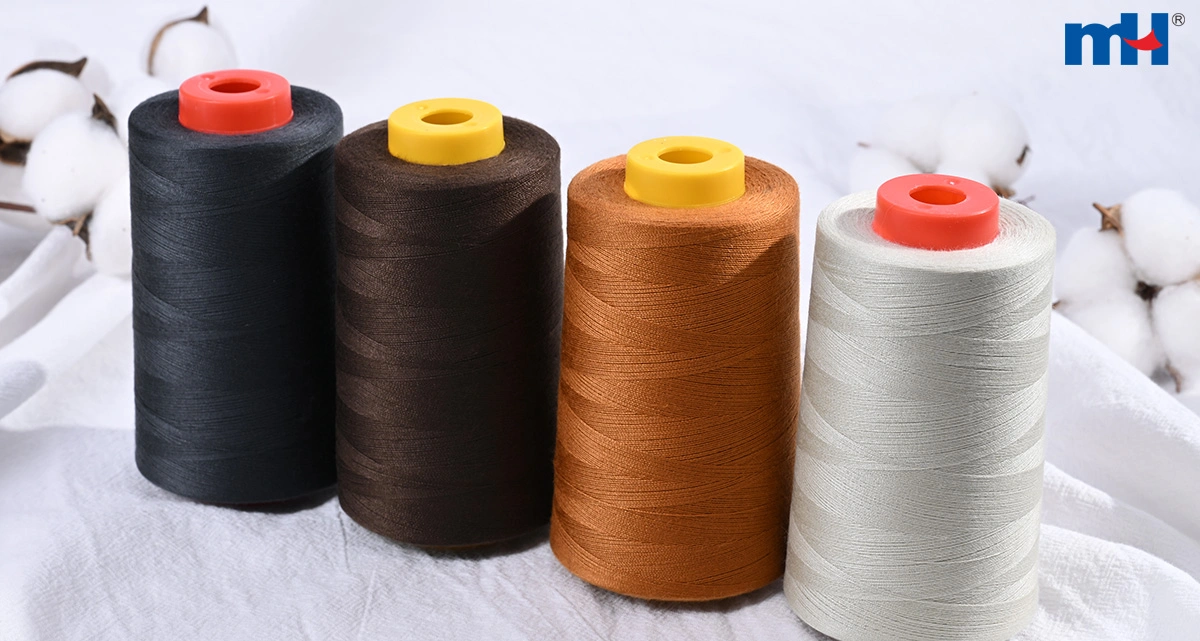
Natural and soft, making it perfect for breathable garments and delicate fabrics.
- Features: Natural look, good heat resistance, easy dyeing.
- Applications: Used in embroidery, quilting, and cotton-based apparel.
MH Cotton Thread Highlights:
- Smooth and lint-free for high-speed machines.
- Available in mercerized and non-mercerized finishes.
3. Embroidery Thread for Machines
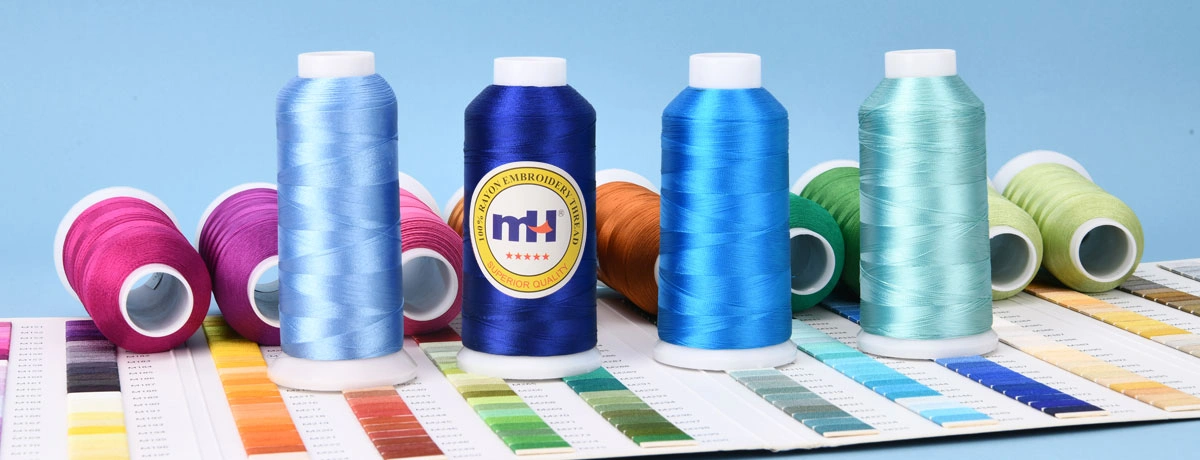
Specially designed for decorative stitching, embroidery thread enhances product appearance with vibrant color and shine. Matching the thread colour to your fabric is essential for achieving professional-looking embroidery results and maintaining aesthetic harmony in your projects.
MH Embroidery Series:
- Rayon Embroidery Thread: Known for high sheen and smooth texture. Specialty threads, such as metallic embroidery threads, can break easily if not handled with care, so it's important to sew slowly and use the appropriate needle.
- Polyester Embroidery Thread: Offers bright color, high strength, and excellent wash resistance—perfect for industrial embroidery machines. Using wax as a thread conditioner can help reduce tangling and improve thread smoothness during embroidery.
Thread Weight and Sewing Machine Compatibility
Thread weight plays a pivotal role in ensuring your sewing machine delivers the best results for every sewing project. The right thread weight not only impacts the strength and appearance of your stitches but also helps prevent common issues like thread breakage, skipped stitches, and uneven tension. When selecting sewing machine threads, always check the thread weight indicated on the spool—this number tells you how thick or fine the thread is. For example, a lower thread weight number means a thicker thread, which is perfect for heavy fabrics like denim or upholstery, while a higher number indicates a finer thread, ideal for delicate fabrics and lightweight garments.
For most general sewing projects, a 50-weight all purpose thread is a reliable choice, offering versatility for quilting, garment construction, and crafts. If you’re working with thick layers or tough materials, such as sewing jeans or upholstery, a 30-weight upholstery thread provides the extra durability needed to withstand repeated wear and washing. On the other hand, for fine fabrics or detailed work, a higher weight cotton thread or specialty threads like serger thread can help achieve a soft, professional finish without damaging the material.
It’s important to note that not all sewing machines handle every thread type or weight equally well. Always consult your machine’s manual to verify which thread weights and types are suitable for your model. Some machines may require adjustments to the needle size or tension settings when switching between different threads, especially when using specialty threads or working on stretch fabrics.
Stocking your sewing room with a variety of threads—including polyester thread for strength, cotton thread for softness, and specialty threads for unique projects—ensures you’re prepared for any sewing challenge. Having the right thread on hand makes a big difference in the quality and durability of your finished projects, whether you’re sewing garments, quilting, or crafting home décor. By understanding thread weight and machine compatibility, you can confidently select the best thread for each project, resulting in strong seams, beautiful colors, and professional-quality results every time.
Why Choose MH Sewing Thread Factory?
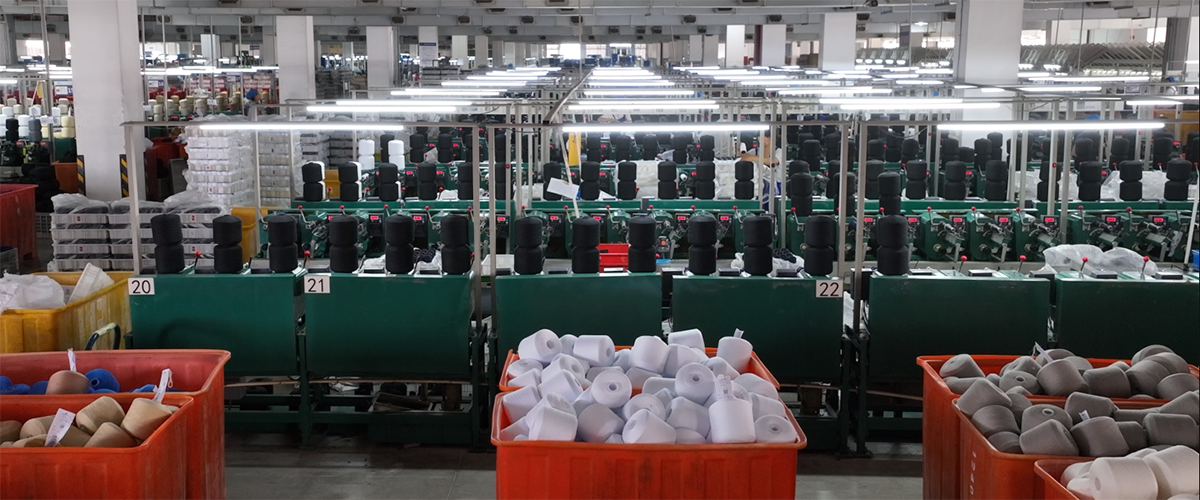
MH (Ningbo MH Industry Co., Ltd.) is one of the largest sewing thread manufacturers in China, with over 35,000 tons of annual production capacity. For over 25 years, MH has supplied garment factories, wholesalers, and textile manufacturers in more than 150 countries.
Factory Advantages:
- Fully integrated production: From spinning and dyeing to winding and packaging.
- Strict quality control: Each batch tested for colorfastness, tensile strength, and uniformity.
- OEM/ODM capability: Custom thread colors, labels, and packaging available for brand partners.
- Wide product range: From domestic to industrial-grade threads.
-
Threads for any job: MH offers threads suitable for any job, from delicate garments to heavy-duty industrial applications.
How to Select the Right Sewing Thread for Your Machine
-
Match Thread Type to Fabric:
- Use polyester thread for synthetic fabrics.
- Choose cotton for natural fibers.
- Opt for bonded polyester or nylon for heavy materials.
-
Check Machine Compatibility:High-speed industrial machines require smooth, strong threads with consistent tension performance.
- If you experience issues like knotting or tangling, try adjusting the tension settings on your machine to resolve these problems.
- Choose the Correct Ticket Size (Tex or Denier):Fine fabrics require thinner thread; thick materials need heavier thread.
- Test Before Mass Production:Run a few stitches to check for tension balance and color accuracy.
- For techniques like shirring or decorative stitching, wind specialty threads onto the bobbin to achieve the desired effect.
- Always consider the requirements of your sewing patterns when selecting thread type and color to ensure the best results for your project.
Why MH Threads Stand Out for Industrial Use
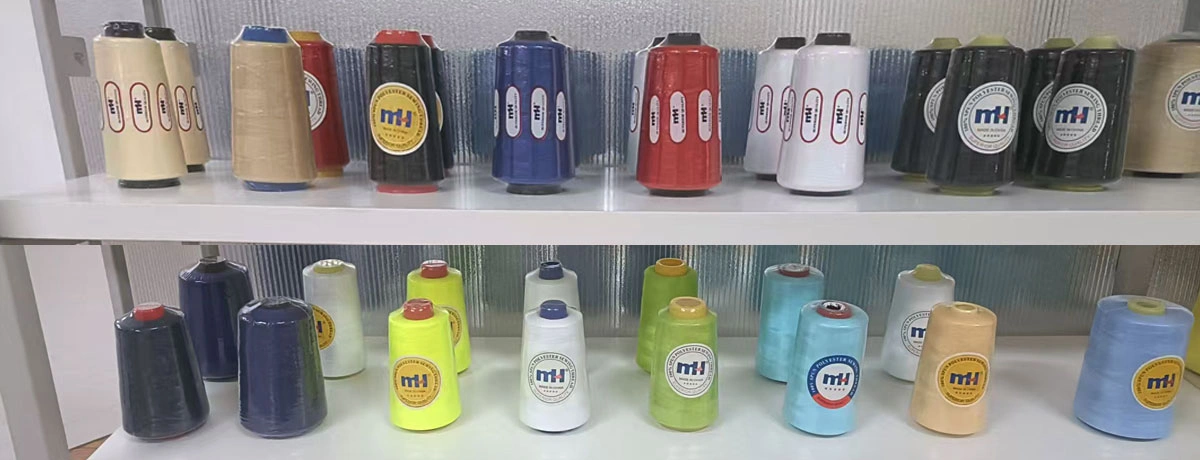
MH threads are engineered for high-speed sewing, maintaining consistent lubrication and tension even at 5,000+ stitches per minute. They undergo eco-friendly dyeing and ISO-certified production, ensuring compliance with global textile standards such as OEKO-TEX Standard 100.
Key Benefits for B2B Buyers:
- Stable supply chain and short lead time.
- Competitive factory prices.
- Over 800 thread colors available.
- Global logistics support and multi-language customer service.
- Specialized hand quilting thread available, coated for durability and smooth stitching through multiple fabric layers.
Applications of MH Sewing Machine Thread
MH sewing threads are widely used in:
- Apparel manufacturing: T-shirts, jeans, uniforms, workwear.
- Knits and stretch fabrics: Ideal for sewing knits, activewear, and other stretch garments, ensuring flexibility and resilience.
- Home textiles: Curtains, bed sheets, cushions.
- Industrial products: Leather goods, footwear, bags, automotive interiors.
- Embroidery and decoration: Logos, patches, and fashion embellishments.
Partner with MH for Your Thread Supply
As a professional sewing machine thread factory, MH not only provides consistent quality but also offers customization, technical support, and brand collaboration. Whether you’re a garment producer, fabric wholesaler, or importer, MH can tailor solutions that match your production needs.
Contact MH today to request samples or bulk quotations and experience the difference that factory-grade sewing thread quality makes for your business.
 Whatsapp:
Whatsapp: 
